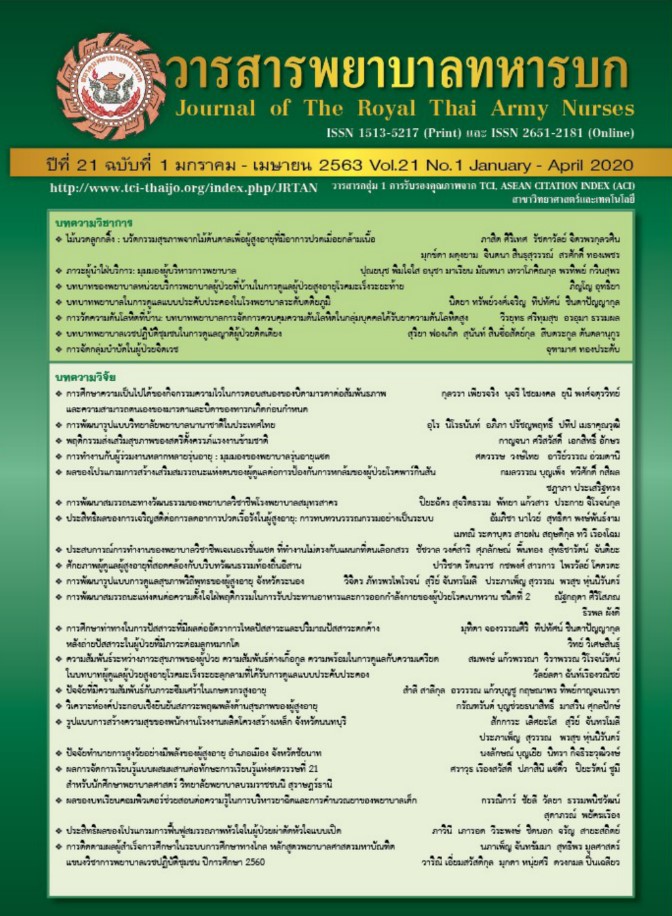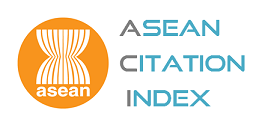การศึกษาความเป็นไปได้ของกิจกรรมความไวในการตอบสนอง ของบิดามารดาต่อสัมพันธภาพและความสามารถตนเองของมารดา และบิดาของทารกเกิดก่อนกำหนด
คำสำคัญ:
สัมพันธภาพ, ความเป็นไปได้, ความไวในการตอบสนองของบิดามารดา, ทารกเกิดก่อนกำหนด, การรับรู้ความสามารถของตนเองบทคัดย่อ
การวิจัยแบบก่อนการทดลองวัดผลก่อน หลัง และระยะติดตามนี้มีวัตถุประสงค์เพื่อศึกษาความเป็นไปได้ของกิจกรรม ความไวในการตอบสนองของบิดามารดาต่อสัมพันธภาพและความสามารถตนเองในการดูแลทารกเกิดก่อนกำหนดของมารดาและ บิดา ผู้เข้าร่วมวิจัยคัดเลือกแบบเจาะจง คือบิดา มารดา และทารกเกิดก่อนกำหนดจำนวน 4 ชุด ทารกเข้ารับการรักษาในหอผู้ป่วย ทารกแรกเกิดป่วยในโรงพยาบาลแห่งหนึ่งในประเทศไทย กลุ่มตัวอย่างได้รับกิจกรรมความไวในการตอบสนองทั้งหมดมี 4 ขั้นตอน ขั้นตอนละ 60-90 นาที เครื่องมือที่เก็บรวบรวมข้อมูลประกอบด้วยแบบสอบถามความผูกพันหลังคลอด และแบบสอบถามความ เชื่อมั่นของมารดา/บิดา มีค่าความเชื่อมั่นเท่ากับ 0.73 และ 0.75 ตามลำดับ วัดผล 3 ครั้งคือก่อนให้การทดลอง หลังเสร็จสิ้นการ ทดลอง และระยะติดตามวิเคราะห์ข้อมูลโดยใช้สถิติเชิงพรรณนา และการทดสอบฟรีดแมน
ผลการวิจัยพบว่าภายหลังเสร็จสิ้นการทดลองและระยะติดตาม สัมพันธภาพระหว่างมารดากับทารก ความสามารถของ ตนเองของมารดา สัมพันธภาพระหว่างบิดากับทารก และความสามารถของตนเองของบิดา มีคะแนนดีกว่าก่อนการทดลอง (p<.05). ผลการวิจัยนี้แสดงให้เห็นว่ากิจกรรมความไวในการตอบสนองของบิดามารดาเหมาะสมและมีความเป็นไปได้สำหรับนำไปปฏิบัติใน อนาคต
Downloads
เอกสารอ้างอิง
outcomes of prematurity at 18 months. Pediatrics. 2006; 118(1): 107-114.
2. Muller-Nix, C., Forcada-Guex, M., Pierrehumbert, B., Jaunin, L., Borghini, A., & Ansermet, F. Prematurity, maternal stress and mother–child
interactions. Early human development. 2004; 79(2): 145-158.
3. Grant, K. A., McMahon, C., & Austin, M. P. Maternal anxiety during the transition to parenthood: a prospective study. Journal of affective
disorders. 2008; 108(1): 101-111.
4. Greisen, G., Mirante, N., Haumont, D., Pierrat, V., Pallas-Alonso, C. R., Warren, I., & Cuttini, M. Parents, siblings and grandparents in the
Neonatal Intensive Care Unit A survey of policies in eight European countries. Acta paediatrica. 2009; 98(11): 1744-1750.
5. Honda, M., Som, R., Seang, S., Tung, R., & Iwamoto, A. One year outcome of high-risk newborn infants discharged from the neonatal care unit of the National Maternal and Child Health Center in Cambodia. Heliyon, 2019; 5(4): e01446.
6. McInnes, R. J., & Chambers, J. Infants admitted to neonatal units–interventions to improve breastfeeding outcomes: a systematic review
1990–2007. Maternal & child nutrition. 2008; 4(4): 235-263.
7. Bowlby, J. Attachment. New York: Basic book; 1969.
8. Klaus, M. H., & Kennell, J. H. Parent-infant bonding. CV Mosby; 1982.
9. Kleebpan, S., Phahuwatanakorn, W., Yusamran, C., & Putdivarnichapong, W. Factors Influencing Parental Competence in First-Time Postpartum
Mothers. Journal of The Royal Thai Army Nurses. 2019; 20(2): 140-149. (in Thai)
10. Yakasem, P., Chaimongkol, N., & Pongjaturawit, Y. Experience of becoming a Thai early adolescent mother. Journal of The Royal Thai Army Nurses. 2018; 19(3): 89-96. (in Thai)
11. Littleton, L. Y., & Engebretson, J. C. Maternal, Neonatal and women’s Health Nursing. Delmar, Thomson Learning; 2002.
12. Satipan, C. Marital Relationship, Father–infant Attachment and Father Involvement in Postpartum Period [Thesis]: Chiangmai University; 2014. (in Thai)
13. Tapanya, S. Attributions and attitudes of mothers and fathers in Thailand. Parenting. 2011; 11 (2-3): 190-198. (in Thai)
14. Shin, H., Park, Y-J., & Kim, M. J. Predictors of maternal sensitivity during the early postpartum period. Journal of Advanced Nursing. 2006;
55(4): 425-434.
15. Sevigny, P. R., & Loutzenhiser, L. Predictors of parenting self-efficacy in mothers and fathers of toddlers. Child: Care, Health and Development. 2010; 36: 179–189.
16. Coleman, P. K., & Karraker, K. H. Maternal self-efficacy beliefs, competence in parenting, and toddlers’ behavior and developmental status. Infant Mental Health Journal: Official Publication of the World Association for Infant Mental Health. 2003; 24(2): 126-148.
17. Badr, L. K. Further psychometric testing and use of the Maternal Confidence Questionnaire. Issues in Comprehensive Pediatric Nursing. 2005; 28(3): 163-174.
18. Ahn, H. Y., Lee, J., & Shin, H. J. Kangaroo care on premature infant growth and maternal attachment and post-partum depression in South Korea. Journal of tropical pediatrics. 2010; 56(5): 342-344.
19. Chen, E. M., Gau, M. L., Liu, C. Y., & Lee, T. Y. Effects of Father-Neonate Skin-to-Skin Contact on Attachment: A Randomized Controlled Trial. Nursing research and practice. 2017.
20. Holditch-Davis, D., White-Traut, R. C., Levy, J. A., O’Shea, T. M., Geraldo, V., & David, R. J. Maternally administered interventions for preterm infants in the NICU: Effects on maternal psychological distress and mother–infant relationship. Infant Behavior and Development. 2014; 37(4): 695-710.
21. Moore, E. R., Anderson, G. C., Bergman, N., & Dowswell, T. Early skin-to-skin contact for mothers and their healthy newborn infants. Cochrane Database Syst Rev. 2012; 5(5).
22. Sunanta, S., Yusamran, C., & Phahuwatanakorn, W. Effect of Providing Knowledge and Support Primiparous Adolescent Mother and Grandmother on Maternal Role Attainment. Journal of The Royal Thai Army Nurses. 2016; 17(2): 125-134. (in Thai)
23. Promneramit P. The effects of the paternal role promotion program on paternal-infant attachment and paternal role adaptation for first-time fathers. [Thesis]: Mahidol University; 2005. (in Thai)
24. Shorey, S., He, H. G., & Morelius, E. Skin-to-skin contact by fathers and the impact on infant and paternal outcomes: an integrative review. Midwifery. 2016; 40: 207-217.
25. Varela, N., Dclinpsy, P. M., Tessier, R., & Charpak, N. Indian Fathers and Their Premature Baby An Early Beginning: A Pilot Study of Skin-to-Skin
Contact, Culture and Fatherhood. Fathering. 2014; 12(2): 211.
26. Yang, H. L., Chen, Y. C., Mao, H. C., Gau, B. S., & Wang, J. K. Effect of a systematic discharge nursing plan on mothers’ knowledge and confidence in caring for infants with congenital heart disease at home. 2004; 103(1): 47-52.
27. Kusanagi, M., Hirose, T., Mikuni, K., & Okamitsu, M. Effect of early intervention using state modulation and cue reading on mother-infant
interactions in preterm infants and their mothers in Japan. Journal of medical and dental sciences 2011; 58(3): 89-96.
28. Brockington, I. F., Oates, J., George, S., Turner, D., Vostanis, P., Sullivan, M & Murdoch, C. A screening questionnaire for mother-infant bonding disorders. Archives of Women’s Mental Health. 2001; 3(4): 133-140.
29. Parker, S., & Zahr, L. K.The maternal confidence questionnaire. Boston, MA: Boston City Hospital; 1985.
30. Bostanabad, M. A., Areshtanab, H. N., Balila, M., Jafarabadi, M. A., & Ravanbakhsh, K. Effect of a Supportive-Training Intervention on Mother-Infant Attachment. Iranian Journal of Pediatrics. 2017; 27(6).
31. Chung, F. F., Wan, G. H., Kuo, S. C., Lin, K. C., & Liu, H. E. Mother–infant interaction quality and sense of parenting competence at six months
postpartum for first-time mothers in Taiwan: a multiple time series design. BMC pregnancy and childbirth. 2018; 18(1): 365.
32. Newnham, C. A., Milgrom, J., & Skouteris, H. Effectiveness of a modified mother–infant transaction program on outcomes for preterm infants from 3 to 24 months of age. Infant behavior and development. 2009; 32(1): 17-26.
33. Lawrence, P. J., Davies, B., & Ramchandani, P. G. Using video feedback to improve early father–infant interaction: A pilot study. Clinical child psychology and psychiatry. 2013; 18(1):61-71.
34. Kadivar, M., & Mozafarinia, S. M. Supporting fathers in a NICU: Effects of the HUG Your Baby program on fathers’ understanding of preterm
infant behavior. The Journal of perinatal education. 2013; 22(2): 113.
ดาวน์โหลด
เผยแพร่แล้ว
รูปแบบการอ้างอิง
ฉบับ
ประเภทบทความ
สัญญาอนุญาต
บทความหรือข้อคิดเห็นใดใดที่ปรากฏในวารสารพยาบาลทหารบกเป็นวรรณกรรมของผู้เขียน ซึ่งบรรณาธิการหรือสมาคมพยาบาลทหารบก ไม่จำเป็นต้องเห็นด้วย
บทความที่ได้รับการตีพิมพ์เป็นลิขสิทธิ์ของวารสารพยาบาลทหารบก
The ideas and opinions expressed in the Journal of The Royal Thai Army Nurses are those of the authors and not necessarily those
of the editor or Royal Thai Army Nurses Association.







